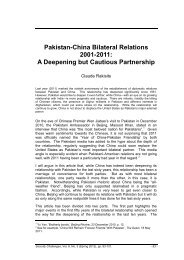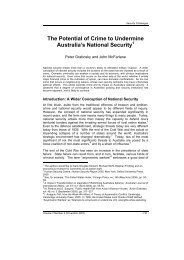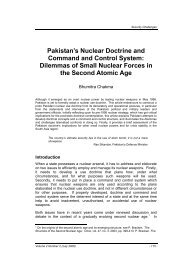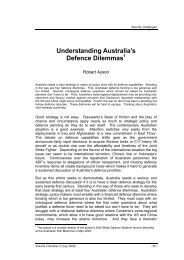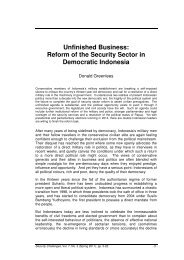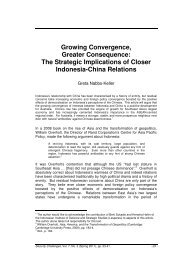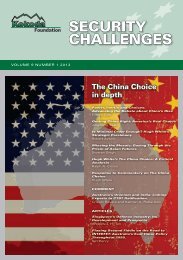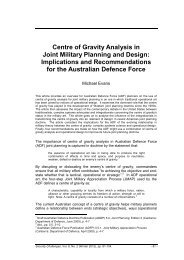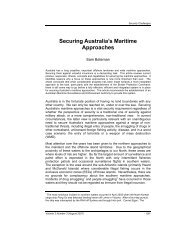The Transformation of Triad - Security Challenges
The Transformation of Triad - Security Challenges
The Transformation of Triad - Security Challenges
Create successful ePaper yourself
Turn your PDF publications into a flip-book with our unique Google optimized e-Paper software.
Roderic Broadhurst and Lee King Wa<br />
about greater inclusion from an indigenous government, combined to deliver<br />
real politics to a government needing to reassure business and community<br />
that it would play fair. 176 <strong>The</strong> three pillars <strong>of</strong> governance in HK—rule <strong>of</strong> law,<br />
personal freedom, and an effective and corrupt free civil service—became<br />
the focus <strong>of</strong> greater public scrutiny.<br />
LEGAL DEVELOPMENTS:NEW POLICE POWERS<br />
Developments in the criminal law in the United Kingdom (UK) 177 and<br />
Australia 178 in the late 1980s and early 1990s, where growing concern about<br />
mafia-like and other serious crime was re-shaping the policing response,<br />
also led to an acceptance <strong>of</strong> greater policing powers to counter organised<br />
crime. Harfield suggested that the creation <strong>of</strong> the national UK Serious and<br />
Organized Crime Agency in 2005 with enhanced powers recognised the<br />
limitations <strong>of</strong> conventional Anglo-Saxon policing in addressing the problem <strong>of</strong><br />
organised crime. In this context, unburdened by the numerous policing<br />
agencies and complexities <strong>of</strong> UK policing, the HK government was able to<br />
proceed more quickly with increased investigative powers, and the<br />
prosecution <strong>of</strong> illegal entrepreneurs and others who fund, assist and derive<br />
criminal proceeds from organised crime became possible. 179<br />
Thus not until nearly fifty years after the overhauled Societies Ordinance <strong>of</strong><br />
1950, but before HK’s sovereignty was transferred to the PRC in 1997, did<br />
the colonial government enact specific measures to counter serious<br />
‘organised’ crime. <strong>The</strong> enactment <strong>of</strong> the Drug Trafficking (Recovery <strong>of</strong><br />
Proceeds) Ordinance in 1989, 180 the Organised and Serious Crimes<br />
Ordinance (OSCO) in 1994 181 and later amendments and statutes granted<br />
law enforcement agencies further powers to investigate and prosecute<br />
patterns <strong>of</strong> unlawful activities associated with organised crime. 182 Ancillary<br />
176 Mitchell, Velvet Colonialism’s Legacy to Hong Kong 1967 and 1997.<br />
177 See C. Harfield, ‘Paradigms, Pathologies, and Practicalities: Policing Organised Crime in<br />
England and Wales’, Policing: A Journal <strong>of</strong> Policy and Practice, vol. 2, no. 1 (2008), pp 63-73.<br />
178 For example the establishment <strong>of</strong> the National Crime Authority (now the Australian Crime<br />
Commission) and the extension <strong>of</strong> investigative powers in respect to interception <strong>of</strong><br />
communications were known by many police and ICAC through attendance at the Australian<br />
Institute <strong>of</strong> Police Management (Manly); see for details <strong>of</strong> the ‘new investigators’ M. Findlay,<br />
‘International Rights and Australian Adaptations: Recent Developments in Criminal<br />
Investigation’, Sydney Law Review, vol. 17, no. 2 (1995), 278-97.<br />
179 Van Duyne and Vander Beken, ‘<strong>The</strong> Incantations <strong>of</strong> the EU Organized Crime Policy Making’,<br />
pp. 267-8 suggest that the United Kingdom ‘discovered’ domestic organised crime in 1993,<br />
however, by the late 1980s British authorities were engaged in addressing the limitations <strong>of</strong> the<br />
Regional Crime Squads—formations to some extent replicated in HK but greatly simplified by<br />
the single police command <strong>of</strong> the HKP; see Harfield, ‘Paradigms, Pathologies, and<br />
Practicalities: Policing Organised Crime in England and Wales’; and also M. Woodiwiss and D.<br />
Hobbs, ‘Organized Evil and the Atlantic Alliance: Moral Panics and the Rhetoric <strong>of</strong> Organized<br />
Crime Policing in America and Britain.’ British Journal <strong>of</strong> Criminology, vol. 49 (2009), pp. 106-<br />
28.<br />
180 Chapter 405, Drug Trafficking (Recovery <strong>of</strong> Proceeds) Ordinance, HKSAR, 1989.<br />
181 Chapter 455, Organized and Serious Crimes Ordinance, HKSAR, 1994.<br />
182 For example, further changes introduced by the Drug Trafficking and Organized Crime<br />
(Amendment) Ordinance 2002, addressed problems in the earlier laws including substantive<br />
- 28 - <strong>Security</strong> <strong>Challenges</strong>



